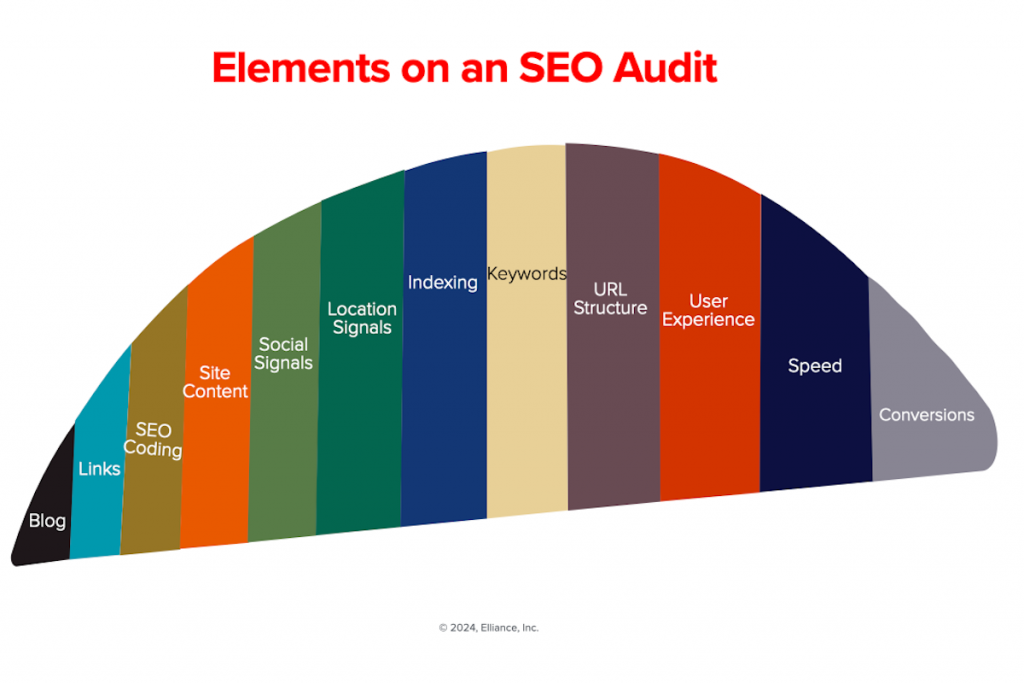| Dec 22, 2023
SEO Audit Services Agency for Colleges, Universities and Higher Education Institutions

As a leading SEO Agency for colleges, universities and higher education institutions, we are frequently asked to share our best practices. This is part of a series of posts to explain how SEO audit can serve their interests.
SEO or “search engine optimization” is the process of improving your website to increase its visibility on Google, Bing and other international search engines.
Institutions that pursue and achieve top organic or natural Google and Bing rankings prosper and thrive. There are good reasons for this. Organic rankings are more trusted, more clicked and out-convert paid advertising leads three-fold. Being found on page 1 is the best means for finding, getting, keeping and growing right-fit students, faculty, and staff as well as nurturing relationships with alumni, foundations corporate partners and media.
When serving higher education institutions, we begin their SEO journey by conducting a twelve-point SEO audit to assess the following:
1. Website Speed and Performance Metrics Audit
We begin by testing site load speed, mobile/desktop performance, secure certificate and domain name analysis. We know that these are all Google and Bing ranking factors.
2. Website URL Structure Audit
We analyze the URL structure to ensure it is rational, descriptive and hierarchical. A good URL structure will accelerate attainment of stronger rankings and simplify analysis of website performance in Google analytics.
For international search rankings, we ensure country-specific domains or or language-specific sites are being leveraged.
3. Website Copy and Content Audit
Next, we analyze website copy, especially academic programs copy, to ensure it is persuasive for prospects, other stakeholders and for Google and Bing bots. We ensure it is infused with appropriate keywords and keyword derivatives.
For international search rankings, we ensure that translated copy exists in country-specific languages.
4. Keyword Audit
Then we evaluate keywords on all website pages. We look for alignment between the page copy and keywords. We also look for and flag keyword stuffing, an illicit SEO technique in which keywords are loaded into a web page’s meta tags, visible content, or link anchor text in an attempt to gain an unfair ranking advantage. We are aware that at best, search engines disregard keyword stuffing and, at worst, penalize a website if it’s packed with too much, irrelevant or unrelated content.
5. User Experience Audit
Since Google and Bing bots reward websites with superior user experience, information architecture and page architecture – for buyers and channel partners alike – we evaluate it carefully.
6. Conversion Architecture Audit
We are aware that a college website is its #1 recruiter. Therefore we ensure that it is efficiently constructed to maximize lead generation, foster applications, and access thought-leadership content. We ensure that It also motivates its alumni, partners and community stakeholders to take the next steps.
7. SEO Coding Audit
Successful websites are built with pristine HTML and CSS (Cascading Style Sheets) which are instructions to browsers to determine characteristics of web page elements such as text size, position of elements on the page, etc. Furthermore, they meet ADA WCAG 2.2 standards dictate accessibility compliance for various audiences. We ensure that the university websites are constructed with best practices because Google and Bing both reward them and penalize websites that aren’t.
8. Social Signals Audit
Effective websites use social sharing buttons and open-graph (OG) tags that facilitate content sharing which is a Google, Bing and international ranking factor. We ensure that they are omnipresent.
9. Internal and External Links Audit
While it’s true that internal site-links and in-bound links are the backbone of Google’s ranking algorithm, outbound links also play an important role. We ensure only highest quality links exist and itemize poor quality links for subsequent link-pruning.
10. Locations Audit
We ensure that locations signals are embedded for the geographies colleges serve.
11. Indexing Audit
We check for site indexing issues using tools like Google Search Console and validate that critical pages are all indexed.
12. Blog Audit
Since blogs are one of the most effective means of securing and lifting Google and Bing page one rankings, we audit their categories, tags and content to reveal areas of improvement.
Armed with the audit, marketers at colleges, universities and higher education institutions are ready to do the hard work of crafting a forward leaning keyword strategy.
If you are seeking an higher education SEO Audit agency to grow your enrollment, endowment and reputation, consider partnering with us.
